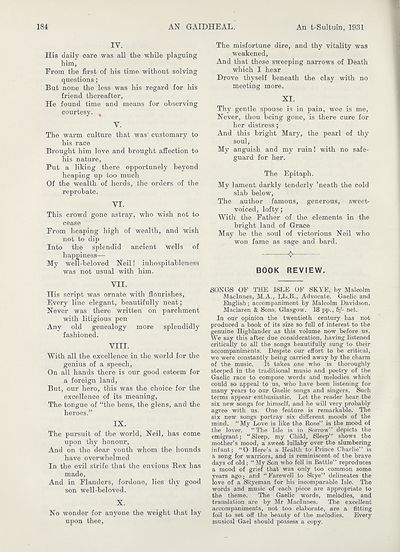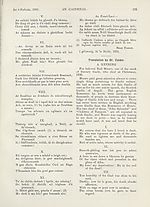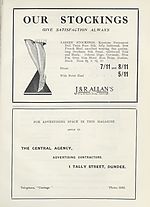An Comunn Gàidhealach Publications > Gaidheal > Volume 26, October 1930--September 1931
(236) Page 184
Download files
Complete book:
Individual page:
Thumbnail gallery: Grid view | List view

184
AN GAIDHEAL.
An t-Sultuin, 1931
IV.
His daily care was all the while plaguing
him,
From the first of his time without solving
questions;
But none the less was his regard for his
friend thereafter,
He found time and means for observing
courtesy. t
V.
The warm culture that was customary to
his race
Brought him love and brought affection to
his nature,
Put a liking there opportunely beyond
heaping up too much
Of the wealth of herds, the orders of the
reprobate.
VI.
This crowd gone astray, who wish not to
cease
From heaping high of wealth, and wish
not to dip
Into the splendid ancient wells of
happiness—
My well-beloved Neil! inhospitableness
was not usual with him.
VII.
His script was ornate with flourishes,
Every line elegant, beautifully neat;
Never was there written on parchment
with litigious pen
Any old genealogy more splendidly
fashioned.
VIII.
With all the excellence in the world for the
genius of a speech,
On all hands there is our good esteem for
a foreign land,
But, our hero, this was the choice for the
excellence of its meaning,
The tongue of “the bens, the glens, and the
heroes.”
IX.
The pursuit of the world, Neil, has come
upon thy honour,
And on the dear youth whom the hounds
have overwhelmed
In the evil strife that the envious Rex has
made,
And in Flanders, fordone, lies thy good
son well-beloved.
X.
No wonder for anyone the weight that lay
upon thee,
The misfortune dire, and thy vitality was
weakened,
And that these sweeping narrows of Death
which I hear
Drove thyself beneath the clay with no
meeting more.
XI.
Thy gentle spouse is in pain, woe is me,
Never, thou being gone, is there cure for
her distress;
And this bright Mary, the pearl of thy
soul,
My anguish and my ruin! with no safe¬
guard for her.
The Epitaph.
My lament darkly tenderly ’neath the cold
slab below,
The author famous, generous, sweet¬
voiced, lofty;
With the Father of the elements in the
bright land of Grace
May be the soul of victorious Neil who
won fame as sage and bard.
—^>
BOOK REVIEW.
SONGS GF THE ISLE OF SKYE, by Malcolm
Maclnnes, M.A., LL.B., Advocate. Gaelic and
English; accompaniment by Malcolm Davidson.
Maclaren & Sons, Glasgow. 18 pp., 5/- net.
In our opinion the twentieth century has not
produced a book of its size so full of interest to the
genuine Highlander as this volume now before us.
We say this after due consideration, having listened
critically to all the songs beautifully sung to their
accompaniments. Despite our effort to be critical,
we were constantly being carried away by the charm
of the music. It takes one who is thoroughly
steeped in the traditional music and poetpr of the
Gaelic race to compose words and melodies which
could so appeal to us, who have been listening for
many years to our Gaelic songs and singers. Such
terms appear enthusiastic. Let the reader hean the
six new songs for himself, and he will very probably
agree with us. One feature is remarkable. The
six new songs portray six different moods of the
mind. “My Love is like the Rose” is the mood of
the lover. “The Isle is in Sorrow” depicts the
emigrant; “Sleep, my Child, Sleep” shows the
mother’s mood, a sweet lullaby over the slumbering
infant; “O Here’s a Health to Prince Charlie” is
a song for warriors, and is reminiscent of the brave
days of old; “ My Son who fell in Battle” reproduces
a mood of grief that was only too common some
years ago; and “Farewell to Skye” delineates the
love of a Skyeman for his incomparable Isle. The
words and music of each piece are appropriate to
the theme. The Gaelic words, melodies, and
translation are by Mr Maolnnes. The excellent
accompaniments, not too elaborate, are a fitting
foil to set off the beauty of the melodies. Every
musical Gael should possess a copy.
AN GAIDHEAL.
An t-Sultuin, 1931
IV.
His daily care was all the while plaguing
him,
From the first of his time without solving
questions;
But none the less was his regard for his
friend thereafter,
He found time and means for observing
courtesy. t
V.
The warm culture that was customary to
his race
Brought him love and brought affection to
his nature,
Put a liking there opportunely beyond
heaping up too much
Of the wealth of herds, the orders of the
reprobate.
VI.
This crowd gone astray, who wish not to
cease
From heaping high of wealth, and wish
not to dip
Into the splendid ancient wells of
happiness—
My well-beloved Neil! inhospitableness
was not usual with him.
VII.
His script was ornate with flourishes,
Every line elegant, beautifully neat;
Never was there written on parchment
with litigious pen
Any old genealogy more splendidly
fashioned.
VIII.
With all the excellence in the world for the
genius of a speech,
On all hands there is our good esteem for
a foreign land,
But, our hero, this was the choice for the
excellence of its meaning,
The tongue of “the bens, the glens, and the
heroes.”
IX.
The pursuit of the world, Neil, has come
upon thy honour,
And on the dear youth whom the hounds
have overwhelmed
In the evil strife that the envious Rex has
made,
And in Flanders, fordone, lies thy good
son well-beloved.
X.
No wonder for anyone the weight that lay
upon thee,
The misfortune dire, and thy vitality was
weakened,
And that these sweeping narrows of Death
which I hear
Drove thyself beneath the clay with no
meeting more.
XI.
Thy gentle spouse is in pain, woe is me,
Never, thou being gone, is there cure for
her distress;
And this bright Mary, the pearl of thy
soul,
My anguish and my ruin! with no safe¬
guard for her.
The Epitaph.
My lament darkly tenderly ’neath the cold
slab below,
The author famous, generous, sweet¬
voiced, lofty;
With the Father of the elements in the
bright land of Grace
May be the soul of victorious Neil who
won fame as sage and bard.
—^>
BOOK REVIEW.
SONGS GF THE ISLE OF SKYE, by Malcolm
Maclnnes, M.A., LL.B., Advocate. Gaelic and
English; accompaniment by Malcolm Davidson.
Maclaren & Sons, Glasgow. 18 pp., 5/- net.
In our opinion the twentieth century has not
produced a book of its size so full of interest to the
genuine Highlander as this volume now before us.
We say this after due consideration, having listened
critically to all the songs beautifully sung to their
accompaniments. Despite our effort to be critical,
we were constantly being carried away by the charm
of the music. It takes one who is thoroughly
steeped in the traditional music and poetpr of the
Gaelic race to compose words and melodies which
could so appeal to us, who have been listening for
many years to our Gaelic songs and singers. Such
terms appear enthusiastic. Let the reader hean the
six new songs for himself, and he will very probably
agree with us. One feature is remarkable. The
six new songs portray six different moods of the
mind. “My Love is like the Rose” is the mood of
the lover. “The Isle is in Sorrow” depicts the
emigrant; “Sleep, my Child, Sleep” shows the
mother’s mood, a sweet lullaby over the slumbering
infant; “O Here’s a Health to Prince Charlie” is
a song for warriors, and is reminiscent of the brave
days of old; “ My Son who fell in Battle” reproduces
a mood of grief that was only too common some
years ago; and “Farewell to Skye” delineates the
love of a Skyeman for his incomparable Isle. The
words and music of each piece are appropriate to
the theme. The Gaelic words, melodies, and
translation are by Mr Maolnnes. The excellent
accompaniments, not too elaborate, are a fitting
foil to set off the beauty of the melodies. Every
musical Gael should possess a copy.
Set display mode to:
![]() Universal Viewer |
Universal Viewer | ![]() Mirador |
Large image | Transcription
Mirador |
Large image | Transcription
| An Comunn Gàidhealach > An Comunn Gàidhealach Publications > Gaidheal > Volume 26, October 1930--September 1931 > (236) Page 184 |
|---|
| Permanent URL | https://digital.nls.uk/125155236 |
|---|
| Description | This contains items published by An Comunn, which are not specifically Mòd-related. It includes journals, annual reports and corporate documents, policy statements, educational resources and published plays and literature. It is arranged alphabetically by title. |
|---|
| Description | A collection of over 400 items published by An Comunn Gàidhealach, the organisation which promotes Gaelic language and culture and organises the Royal National Mòd. Dating from 1891 up to the present day, the collection includes journals and newspapers, annual reports, educational materials, national Mòd programmes, published Mòd literature and music. |
|---|---|
| Additional NLS resources: |
|

